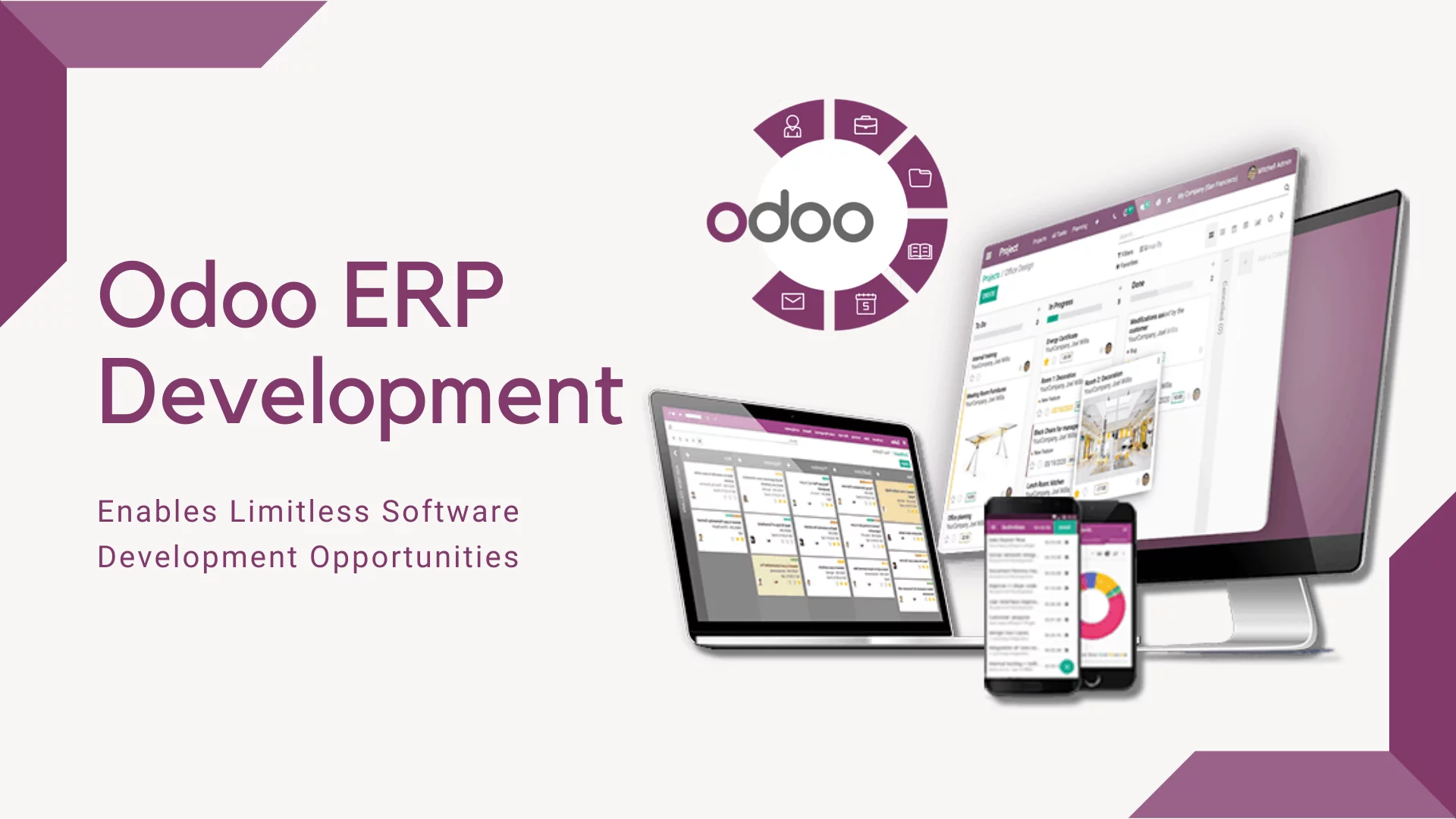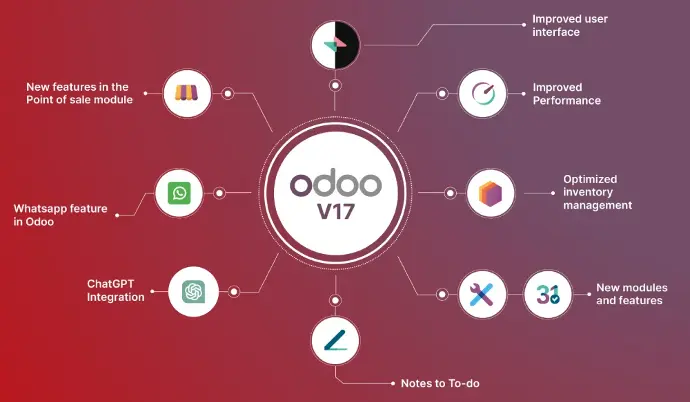What is the Odoo?
Odoo is a comprehensive business management application designed to handle all aspects of your company's operations. It features a wide range of integrated modules including CRM (Customer Relationship Management), Sales, Inventory, Accounting, Manufacturing, Project Management, and more. Essentially, if you are used to using separate applications for different functions, Odoo consolidates all your needs into one platform.
History of Odoo
By 2021, Odoo had over 7 million users and employed more than 1,000 people, according to CEO Fabien Pinckaers.
OpenERP was recognized by Deloitte as the fastest-growing company in Belgium, with a remarkable 1549% growth over five years. .
OpenERP saw significant expansion, reaching over 100 employees.
TinyERP was rebranded as OpenERP, marking the start of its rapid growth.
Odoo Modules
Odoo offers a comprehensive suite of integrated modules that can be tailored to meet the specific needs of your business. These modules cover a wide array of functions, allowing for extensive customization and integration across various business processes. Here is a detailed list of some of the key modules available in Odoo:
1. Sales Management
- Sales Orders: Streamline order processing, track sales performance, and manage customer interactions.
- CRM: Manage customer relationships, track leads, and analyze sales opportunities to improve conversion rates.
- Quotations: Create and send professional quotes to customers, convert quotes into sales orders seamlessly.
2. Accounting and Finance
- Invoicing: Generate and send invoices, track payments, and manage accounts receivable and payable.
- Financial Reports: Create detailed financial reports, including balance sheets, profit and loss statements, and cash flow statements.
- Expense Management: Track and manage employee expenses, streamline reimbursement processes.
3. Inventory Management
- Stock Control: Monitor and manage inventory levels, handle stock movements, and optimize warehousing operations.
- Barcode Scanning: Improve accuracy and efficiency in inventory management using barcode technology.
- Reordering Rules: Set up automated reordering rules to maintain optimal stock levels.
4. Manufacturing
- Production Planning: Plan and manage manufacturing processes, including work orders and production schedules.
- Bill of Materials: Define and manage the components and assemblies required for production.
- Quality Control: Implement quality control checks throughout the manufacturing process to ensure product standards.
5. Human Resources
- Employee Records: Maintain detailed records of employees, including personal information, job roles, and employment history.
- Payroll: Manage payroll processes, including salary calculations, deductions, and tax compliance.
- Recruitment: Streamline recruitment processes, track job applications, and manage candidate evaluations.
6. Project Management
- Task Management: Create and assign tasks, track progress, and manage project timelines and deadlines.
- Timesheets: Record and track time spent on projects, generate reports, and manage billing based on time entries.
- Project Budgeting: Monitor project budgets, track expenses, and manage financial aspects of projects.
7. eCommerce
- Online Store: Set up and manage an online store, handle product listings, and process customer orders.
- Shopping Cart: Provide a seamless shopping experience with a user-friendly shopping cart and checkout process.
- Payment Integration: Integrate various payment gateways to facilitate secure online transactions.
8. Marketing
- Email Marketing: Design and send marketing campaigns, track email performance, and analyze campaign effectiveness.
- Social Media Integration: Manage social media accounts, schedule posts, and track engagement and performance.
- Lead Generation: Capture and manage leads through various marketing channels and track their progress through the sales funnel.
9. Customer Service
- Helpdesk: Manage customer support requests, track issues, and provide timely resolutions.
- Live Chat: Offer real-time support through live chat features integrated into your website or application.
- Knowledge Base: Create and maintain a knowledge base for customers to access self-help resources and FAQs.
10. Website Management
- Website Builder: Easily create and customize your website with a drag-and-drop builder.
- Content Management: Manage website content, including text, images, and multimedia.
- SEO Tools: Optimize your website for search engines with built-in SEO tools and analytics.
These modules can be customized and integrated to suit your specific business requirements, enabling you to streamline operations, enhance efficiency, and drive growth. Odoo's flexibility allows you to mix and match modules to create a tailored solution that meets the unique needs of your business.
Benefits of Using Odoo
Enhancing Company Efficiency and Effectiveness
Odoo’s ERP system integrates all of a company’s operations in real time, making it easier for users in each department to perform their tasks more effectively and efficiently.
Customizable to Your Company’s Needs
One of Odoo’s strengths is its ability to be customized to fit the unique needs of your company. While Odoo comes with best practice features, our consultants, with over 10 years of experience, can help tailor the flow and features to your specifications.
Comprehensive Modules
Odoo offers a comprehensive set of modules that can be used for all of your company's operational needs.
User Friendly
Odoo is easy to use and user-friendly, accessible from any device such as desktops, laptops, or mobile devices.
Odoo’s Uniqueness Compared to Other ERPs
Odoo stands out as a remarkably comprehensive ERP solution that caters especially well to small and medium-sized businesses. Historically, companies looking for robust ERP solutions had to choose from high-cost and complex systems like SAP, Oracle, and MS Dynamics. These traditional ERP systems often involved significant upfront investments and long implementation times, which could be prohibitive for smaller enterprises.
In contrast, Odoo offers a modular and user-friendly design that simplifies the integration of various business processes. Its flexibility allows businesses to start with core functionalities and gradually add more modules as needed. This modular approach means that Odoo can be customized to fit specific business requirements without overwhelming users with unnecessary complexity.
Key Advantages of Odoo:
- Cost-Effectiveness: Unlike its more expensive counterparts, Odoo provides a cost-effective solution without compromising on functionality. This makes it accessible to a wider range of businesses, including those with tighter budgets.
- Modular Architecture: Odoo's modular design means businesses can pick and choose the functionalities they need. This flexibility allows for tailored solutions that can evolve with the company’s growth, unlike monolithic ERP systems that may require extensive reconfiguration.
- User-Friendly Interface: Odoo is renowned for its intuitive user interface, which simplifies navigation and reduces the learning curve for new users. This contrasts sharply with the often complex and cumbersome interfaces of traditional ERP systems.
- Rapid Deployment: Odoo's modern architecture allows for quicker deployment compared to traditional ERP systems. Businesses can get up and running faster, which minimizes downtime and accelerates time-to-value.
- Integration and Scalability: Odoo’s extensive library of integrated applications ensures that businesses can seamlessly connect various functions, from sales and inventory to accounting and human resources. This integration is achieved with a high degree of quality and performance.
- Industry-Specific Solutions: Odoo offers tailored modules for various industries, providing specialized features that cater to the unique needs of different sectors. This ensures that businesses can benefit from industry best practices and advanced functionalities.
Comparison with Other ERP Systems:
- eCommerce: In the realm of eCommerce, Odoo is a cutting-edge solution compared to older platforms like Magento or Prestashop. Its integrated approach combines online store management, customer relationship management, and inventory management in one cohesive system.
- Accounting: When it comes to accounting, Odoo surpasses traditional solutions like QuickBooks and Sage. It offers advanced features such as dynamic financial reporting, real-time data analytics, and customizable dashboards that enhance financial oversight and management.
- Customer Relationship Management (CRM): Odoo’s CRM module is rapidly advancing, often outpacing competitors like Salesforce in terms of innovation and feature set. It provides comprehensive tools for managing customer interactions, tracking sales opportunities, and analyzing customer data.

Odoo Versions
Odoo Versions
Odoo offers two distinct versions, each designed to cater to different needs and preferences:
1. Community Edition
- Overview: The Community Edition is a free, open-source version of Odoo that provides a core set of features suitable for many businesses. It is ideal for companies looking for a cost-effective ERP solution with basic functionality.
- Features: While the Community Edition offers essential modules, it comes with limited features compared to the Enterprise Edition. Some advanced functionalities and support services may be restricted or unavailable.
- Customization and Support: The Community Edition allows for extensive customization, but it relies on community support and documentation. Businesses may need to engage external consultants for advanced customizations or troubleshooting.
2. Enterprise Edition
- Overview: The Enterprise Edition is a licensed version that provides a comprehensive set of features and services, making it suitable for businesses that require advanced functionalities and dedicated support.
- Features: The Enterprise Edition includes dynamic accounting reports, mobile access for Android and iOS devices, payroll management, subscription modules, barcode inventory, and more. These features enhance operational efficiency and provide robust support for complex business processes.
- Cost: The cost of the Enterprise Edition depends on the number of users and modules selected. The licensing fee covers access to premium features, regular updates, and professional support.
- Support and Updates: With the Enterprise Edition, businesses benefit from Odoo’s official support, including updates, bug fixes, and security patches. This ensures a stable and reliable ERP system with access to the latest features and improvements.

Companies Using Odoo
Odoo has gained widespread adoption, with a total of over 7 million users globally. This extensive user base includes a diverse range of companies, from small startups to large enterprises. Some notable companies using Odoo include:
- Coca-Cola Beverages Africa: A major player in the beverage industry, Coca-Cola Beverages Africa leverages Odoo to streamline its complex supply chain and operational processes across multiple countries.
- Danone: As a global leader in dairy products and beverages, Danone utilizes Odoo for managing its extensive inventory, production, and distribution networks efficiently.
- Toyota: This automotive giant uses Odoo to enhance its internal processes, from procurement and supply chain management to financial operations, ensuring seamless integration across its global operations.
- Yokohama: Known for its high-quality tires and rubber products, Yokohama implements Odoo to handle its manufacturing and distribution needs with greater efficiency and accuracy.
- Sodexo: As a global leader in food services and facilities management, Sodexo uses Odoo to manage its extensive service offerings and client relationships, improving operational effectiveness.
- L'Oreal: The world-renowned beauty and cosmetics company employs Odoo for its complex business operations, including supply chain management, customer relationship management, and financial reporting.
These examples highlight Odoo's versatility and capability to support a wide range of industries and business sizes. Whether it's managing intricate supply chains, optimizing production processes, or handling large-scale financial operations, Odoo proves to be a robust and scalable solution.
Odoo's success across these diverse sectors underscores its flexibility and effectiveness in addressing various business needs, making it a preferred choice for many high-profile organizations around the world.
Odoo.sh and Hosting
Odoo offers three hosting options: On-Premise, Odoo Online, and Odoo.sh.
- Odoo Online: Ideal for small companies with simple business processes, this SaaS (Software as a Service) option provides best practice modules without requiring technical expertise. Odoo offers full support for bugs, security updates, and system backups.
- On-Premise: Suitable for businesses with complex processes that need custom security standards. This option allows you full control over the source code and technical aspects, though Odoo will not be responsible for performance issues.
- Odoo.sh: Provides the best solution with a dedicated cloud platform and email server. With Odoo.sh, you have access to the source code and can easily manage branch differences, environment testing, upgrades, third-party integrations, and more.





